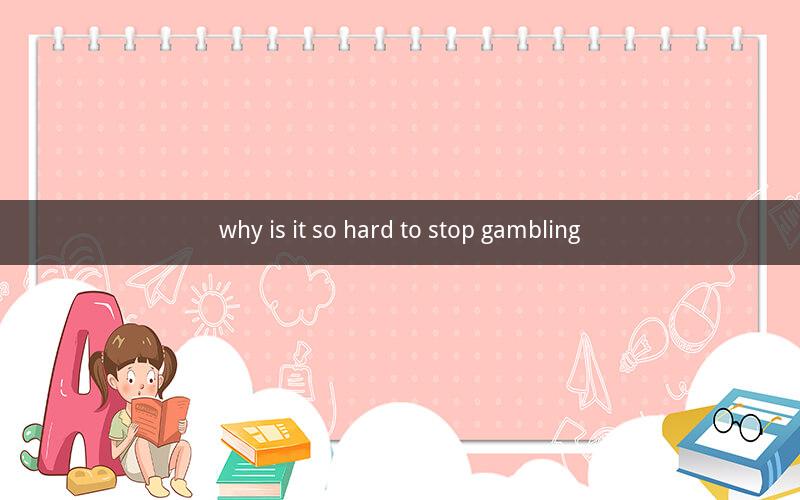
Why Is It So Hard to Stop Gambling?
Table of Contents
1. The Psychological Aspects of Gambling
2. The Social and Economic Impacts of Problem Gambling
3. The Role of Environment and Social Influence
4. The Physical Health Consequences
5. The Psychological Defense Mechanisms
6. The Role of Technology in Facilitating Gambling
7. Treatment and Support for Problem Gamblers
8. The Importance of Education and Awareness
9. The Legal and Ethical Considerations
10. Conclusion
1. The Psychological Aspects of Gambling
Gambling is often seen as a form of entertainment, but it can quickly become an addiction. The psychological aspects of gambling are complex and can vary from person to person. One key factor is the release of dopamine, a neurotransmitter associated with pleasure and reward. The anticipation of winning and the thrill of the game can create a psychological dependence that is difficult to break.
2. The Social and Economic Impacts of Problem Gambling
Problem gambling has significant social and economic consequences. It can lead to financial ruin, strained relationships, and even legal problems. The economic impact is often felt on a larger scale, with governments and communities experiencing lost tax revenue and increased spending on social services.
3. The Role of Environment and Social Influence
The environment in which gambling occurs plays a crucial role in its addictive nature. Accessible gambling venues, advertisements, and the presence of others gambling can all contribute to the difficulty of stopping. Social influences, such as peer pressure or the desire to impress others, can also exacerbate the problem.
4. The Physical Health Consequences
Gambling addiction can have severe physical health consequences. Stress, anxiety, and depression are common, and the financial strain can lead to poor physical health and even suicidal thoughts. The psychological distress can manifest in physical symptoms, further complicating the addiction.
5. The Psychological Defense Mechanisms
Problem gamblers often develop psychological defense mechanisms to cope with their addiction. Denial, rationalization, and avoidance are common strategies used to avoid confronting the problem. These defenses can make it even harder to recognize and address the issue.
6. The Role of Technology in Facilitating Gambling
The advent of technology has made gambling more accessible than ever. Online casinos, mobile apps, and virtual reality gambling platforms have expanded the reach of gambling, making it easier for individuals to engage in risky behavior without the physical presence of a casino.
7. Treatment and Support for Problem Gamblers
Treatment for gambling addiction can involve various approaches, including cognitive-behavioral therapy, medication, and support groups. The importance of seeking professional help cannot be overstated, as it is often the first step towards recovery.
8. The Importance of Education and Awareness
Education and awareness are key to preventing and treating gambling addiction. By understanding the risks and consequences of gambling, individuals can make more informed decisions and seek help if they find themselves struggling.
9. The Legal and Ethical Considerations
The legal and ethical considerations surrounding gambling are complex. Governments must balance the economic benefits of gambling with the potential harm it can cause. Ethical questions arise regarding the promotion and accessibility of gambling, as well as the responsibility of operators to protect their customers.
10. Conclusion
Stopping gambling addiction is a challenging process that requires a multifaceted approach. Understanding the psychological, social, and economic aspects of gambling addiction is crucial for effective treatment and prevention. By addressing these factors, individuals and communities can work towards a healthier and more responsible approach to gambling.
---
Questions and Answers
1. Q: Can someone become addicted to gambling without realizing it?
A: Yes, many individuals become addicted without realizing the extent of their problem, as the addiction can develop gradually over time.
2. Q: How can gambling addiction affect family life?
A: Gambling addiction can lead to financial strain, emotional turmoil, and strained relationships, often causing significant distress within the family unit.
3. Q: Is there a difference between problem gambling and compulsive gambling?
A: While both involve problematic gambling behaviors, problem gambling refers to any form of gambling that causes distress, while compulsive gambling is a severe form of problem gambling characterized by an inability to control gambling behavior.
4. Q: Can gambling addiction be cured?
A: While there is no guaranteed cure for gambling addiction, many individuals can achieve long-term recovery through treatment, support, and lifestyle changes.
5. Q: What are some signs that someone might have a gambling problem?
A: Signs include secretive behavior, financial problems, neglecting responsibilities, and an increasing amount of time spent on gambling activities.
6. Q: How can friends and family help someone with a gambling problem?
A: They can offer support, encourage the individual to seek help, and be understanding during the recovery process. It's important to maintain boundaries and not enable the gambling behavior.
7. Q: Are there any medications that can help treat gambling addiction?
A: Some medications, such as mood stabilizers and anti-depressants, may be prescribed to help manage the underlying conditions that contribute to gambling addiction.
8. Q: Can online gambling be more addictive than traditional gambling?
A: Yes, online gambling can be more addictive due to its convenience, accessibility, and the ability to engage in gambling activities without social pressure.
9. Q: How can governments regulate gambling to minimize harm?
A: Governments can regulate gambling through licensing requirements, age restrictions, advertising restrictions, and funding for treatment and research.
10. Q: Can a person recover from gambling addiction on their own?
A: While some individuals may manage to recover on their own, seeking professional help and joining support groups can significantly increase the chances of successful recovery.